Project
Vietnam welcomes European firms for shared successes: PM
Published
1 year agoon
The European Union (EU)’s investment in Vietnam now tops 30.4 billion USD, ranking as the sixth largest foreign investor in Vietnam. Two-way trade hit 68.5 billion USD last year.
Hanoi – Prime Minister Pham Minh Chinh chaired a dialogue with European enterprises in Hanoi on March 2 to boost cooperation and investment, aiming to achieve a growth rate of at least 8 per cent this year, paving the way for double-digit growth in the years ahead.
The event also the attendance of Deputy PMs Ho Duc Phoc and Nguyen Chi Dung, Head of the EU Delegation to Vietnam Ambassador Julien Guerrier, representatives from embassies of EU nations, 15 leading Vietnamese groups and corporations and 16 top European firms.
The European Union (EU)’s investment in Vietnam now tops 30.4 billion USD, ranking as the sixth largest foreign investor in Vietnam. Two-way trade hit 68.5 billion USD last year.
European representatives praised Vietnam’s business and investment climate, highlighting recent regulatory reforms that have improved transparency, clarity, and decisiveness in the legal framework for investors.
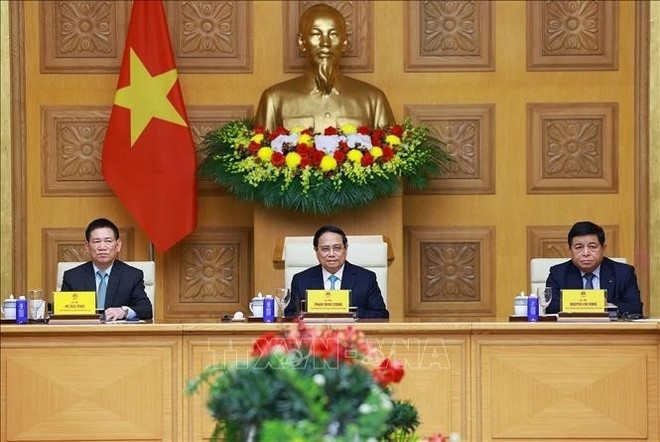 |
| PM Pham Minh Chinh (centre) and Deputy PMs Ho Duc Phoc (left) and Nguyen Chi Dung (right) at the dialogue. (Photo: VNA) |
The EU-Vietnam Free Trade Agreement (EVFTA) has further encouraged European businesses to expand their investments in Vietnam, contributing to the country’s economic growth. Through the Just Energy Transition Partnership (JETP), the EU is supporting Vietnam in achieving net-zero emissions by 2050.
A recent survey revealed that 75 per cent of European enterprises recommend Vietnam as a key investment hub, reflecting strong confidence in the country’s economic potential.
European enterprises expressed their commitments to long-term operations in Vietnam, pledging to work closely with the Vietnamese Government, ministries and agencies to draw more international investors to the country.
They called on Vietnamese ministries and agencies to effectively implement the EVFTA, particularly regulations on taxation and fees. They underscored the need for faster decision-making, streamlined administrative procedures, and simplified requirements for work permits.
Expressing their interest in expanding investments in Vietnam, especially in strategic infrastructure, emerging industries such as semiconductor, digital transformation, high technology, aviation, electronics, logistics, and clean energy, the representatives said they are willing to help Vietnam achieve its goal of becoming a developed country by 2045.
Vietnam needs to ramp up global promotion efforts to attract tourism and investment, improving its national competitiveness and global brand presence, they said.
Thanking the ambassadors, the Head of the EU Delegation, and European corporations in Vietnam for their frank, sincere, and constructive and responsible discussions, PM Chinh assured attendees that the Vietnamese government, along with relevant ministries and agencies, would carefully review all feedback from the event, as well as define specific tasks, timelines, expected outcomes, and measurable results to promptly address key issues and achieve major development goals.
PM Chinh stressed the need for global solidarity and approaches as well as coordinated efforts to effectively tackle fast-changing and unpredictable global challenges.
Reflecting on 35 years of Vietnam-EU diplomatic relations, PM Chinh praised the EU’s support for Vietnam’s development, especially in the fields of economy, investment, and trade. He acknowledged Europe’s shared commitment to the Vietnamese people’s pursuit of freedom and prosperity.
PM Chinh stressed Vietnam’s economic growth targets of at least 8 per cent this year and called for Europe’s continued support to help the country reach the goal, thus maintaining momentum for double-digit growth in the coming years.
He highlighted Vietnam’s strategic advantages, including a large population, a prime geopolitical position in Asia’s growth region, and a stable, peaceful environment conducive to development. These factors, he said, make Vietnam an ideal hub for production, business, and exports.
PM Chinh affirmed Vietnam’s readiness to welcome high-level EU leaders for substantive visits aimed at fostering a more favourable environment for European businesses and improving Vietnam’s investment and business climate.
Mentioning existing challenges, the PM acknowledged procedural bottlenecks, compliance costs, slow decision-making, and issues related to taxation and customs. He assured that the Vietnamese government is committed to resolving these obstacles based on principles that benefit both European businesses and Vietnam’s economic growth.
Sharing Vietnam’s socio-economic achievements in 2024, the PM expressed his gratitude for the EU’s contributions and the role of European businesses in the country’s success. Looking ahead, he underscored Vietnam’s determination to achieve even higher growth rates and become a major economic, trade, and investment hub in Asia by 2030.
The PM called on EU businesses to expand their operations in Vietnam, positioning the country as a key production and supply chain hub. He reassured European investors of Vietnam’s commitment to providing opportunities, trust, and necessary conditions, making the nation a safe and beneficial investment destination.
The Government leader noted that in 2024, Vietnam saw its international credit rating upgraded, and in response, the country has focused on three strategic breakthroughs on institutions, infrastructure, and high-quality human resources development as well as on open policies, seamless infrastructure connectivity, and smart governance.
He said to meet the demands of high-tech industries such as semiconductor manufacturing, artificial intelligence (AI), cloud computing, and quantum technology, Vietnam aims to train 50,000 semiconductor engineers. The Government, meanwhile, is set to cut at least 30 per cent of administrative procedures, reduce 30 per cent of administrative costs, and shorten decision-making time for investment and business approvals by at least 30 per cent.
The PM stated that Vietnam remains steadfast in maintaining independence, sovereignty, territorial integrity, political stability, social order, and legal stability, ensuring a secure and stable business environment for European enterprises.
He called on European investors to carry out greater high-quality investments, boost advanced technology transfer, and support skilled workforce development for Vietnam in such areas as green economy, digital economy, circular economy, creative economy, knowledge-based economy, sharing economy, new energy, development of financial centres, green finance, marine economy, biotechnology, and healthcare.
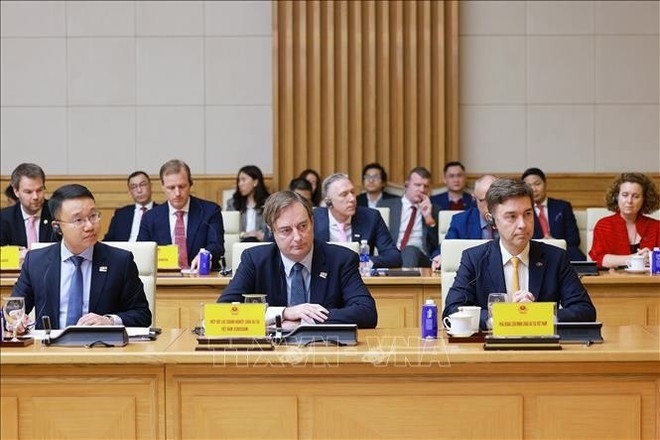 |
| Representatives of European businesses and organisations. (Photo: VNA) |
PM Chinh also urged stronger collaboration between European businesses and their Vietnamese counterparts to assist the latter’s supply chain integration, market diversification, and turning into a long-term production and business hub for the EU. The leader also encouraged the European partners to engage in consultancy serving Vietnam’s institutional building and policymaking.
The PM called on the European business community to advocate for the swift ratification of the EU-Vietnam Investment Protection Agreement (EVIPA) by nine remaining EU member states, as well as the European Commission (EC)’s lifting the IUU “yellow card” against Vietnamese seafood exports. He called for their participation in the country’s project to grow 1 million hectares of low-emission rice in the Mekong Delta, and support for the EU’s continue official development assistance (ODA) for Vietnam through bilateral cooperation channels.
The Vietnamese Government is committed to ensuring the foreign-invested sector remains a vital part of the national economy, while safeguarding the legitimate rights and interests of enterprises, PM Chinh affirmed.
You may like
-
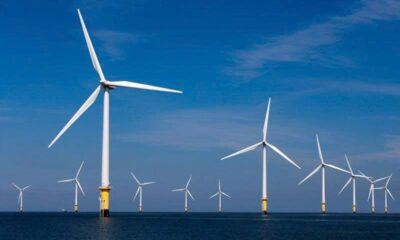

Vietnam’s Exclusive Economic Zone boasts over 1,000 GW of wind power potential: report
-
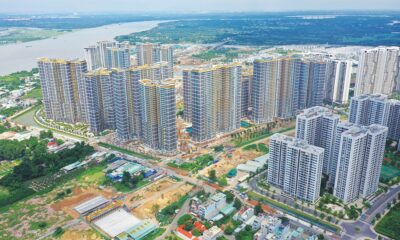

Uncertainty weighing on real estate
-


Central Vietnam city seeks $1.84 bln for 15 projects in economic zone
-
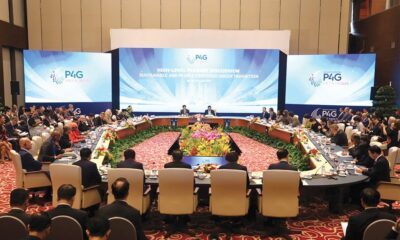

Green engagement rides high in Vietnam
-
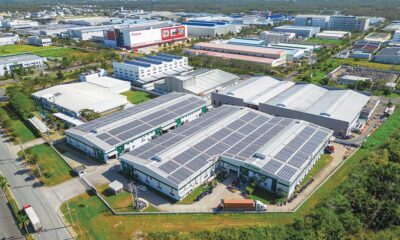

New standards being reached within green industrial parks
-
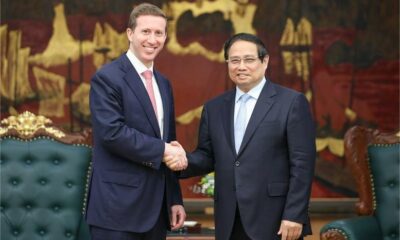

Vietnam PM asks Warburg Pincus to invest ‘further and faster’
Project
Vietnam’s Exclusive Economic Zone boasts over 1,000 GW of wind power potential: report
Published
10 months agoon
April 27, 2025Vietnam’s Exclusive Economic Zone (EEZ) has a wind power potential of 1,068 GW, nearly 470 GW more than previously estimated, according to a report released Friday by the National Center for Hydro-Meteorological Forecasting (NCHMF).
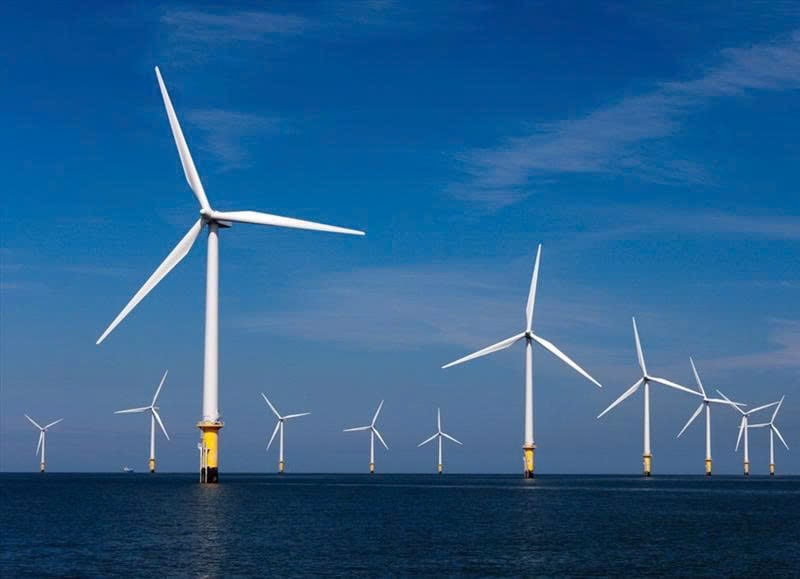
An offshore wind power project in Vietnam. Photo courtesy of VnEconomy.
The report, titled “Detailed Assessment of Wind Resource Potential in Coastal (up to 6 Nautical Miles) and Offshore Areas in Vietnam,” was conducted by the NCHMF with support from the United Nations Development Program (UNDP) and the Norwegian Embassy.
This wind potential was measured at a height of 100 meters above sea level, said Mai Van Khiem, director of the NCHMF. He noted that from November to February each year, wind capacity accounts for half of the annual total – peaking in December and gradually decreasing, with the lowest levels recorded in May.
The southern offshore areas account for 894 GW of this potential, while the northern areas contribute 174 GW.
In nearshore zones (up to 6 nautical miles), the total technical wind power potential is 57.8 GW. The Bac Lieu-Ca Mau region alone contributes nearly 30% of this, while the Ninh Thuan-Binh Thuan area accounts for 24 GW. Although the Quang Tri-Hue region has lower potential, it offers stable wind speeds during the winter months. The Red River Delta has a modest potential of 0.17 GW.
Compared to previous assessments, such as the World Bank’s 2021 study and data from the Global Wind Atlas (GWA), this report provides more detailed and higher-resolution information, both spatially and temporally.
“Notably, the EEZ potential outlined in this report exceeds the World Bank’s estimate by 469 GW, primarily due to the broader scope of the survey and more refined climate modeling using domestic observational data,” the research team explained.
They also emphasized the use of the Weather Research and Forecasting (WRF) model customized specifically for Vietnam, which enhanced the accuracy of the results.
The findings are based on wind data collected from 26 coastal and island meteorological stations, satellite sources from CCMP, ASCAT, and SCATSAT-1 (covering 30 years of ocean surface wind data), as well as buoy data from Nghe An province and seabed depth measurements.
A key innovation in this report is the integration of potential impacts from extreme weather events. Typhoons and tropical depressions occurring between August and October pose structural and safety risks to wind turbines. Meanwhile, strong winds and high waves during the northeast monsoon season can hinder access to and maintenance of offshore wind systems.
To support model calibration and long-term observation, the research team recommends increased investment in offshore wind monitoring stations at heights exceeding 100 meters. They also suggest incorporating these findings into offshore wind development strategies and national marine spatial planning.
Additionally, the team advocates for expanding research into other forms of marine renewable energy, such as wave, tidal, and ocean thermal energy.
“Vietnam has some of the most promising offshore wind resources in the region, creating a strong foundation for the development of a large-scale offshore wind industry. This will contribute to energy security, green economic growth, and the achievement of net zero commitments,” they said.
The study provides a vital scientific basis for policy planning, identifying priority development zones, attracting investment, building infrastructure, and training the future offshore wind workforce, the team added.
Hoang Duc Cuong, deputy director of the Department of Meteorology and Hydrology, emphasized that Vietnam lies within a strong and stable Asian monsoon belt, giving it abundant wind energy potential. He noted that this renewable source will play a key role in meeting the country’s climate change goals and advancing a low-carbon economy.
However, he also warned that marine-based natural disasters are highly complex and could significantly impact the stability of offshore wind operations and energy generation.
The ever-changing status of the global economy following last week’s tariff shocks continue to loom large among investors in Vietnam’s real estate market.
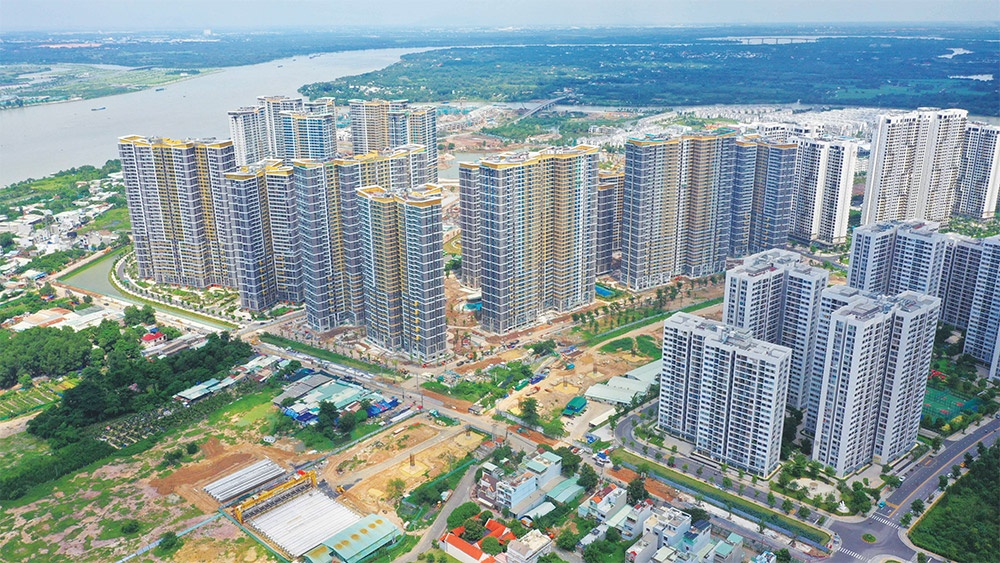 |
| All real estate segments are at risk of losing appeal if high global tariffs are eventually put in place, photo Le Toan |
Pham Lam, vice chairman of the Vietnam Real Estate Association, said that while it is premature to determine the full impact of new US import tariffs on Vietnam’s property market, early signs point to shaken investor sentiment and potential disruptions to foreign investment.
“If multinational corporations scale back or delay their factory expansion plans, the demand for land and factory leasing could decline, which may place downward pressure on industrial rents, lead to increased vacancy, and postpone new industrial zone developments,” he said. “This would affect key industrial property markets such as Bac Ninh, Bac Giang, Haiphong, Long An, and Binh Duong.”
Meanwhile, real estate expert Nguyen Hoang said that the United States remains one of the most critical export destinations for Vietnam’s foreign-invested enterprises.
“Any change in tariffs will significantly influence capital flows, investor confidence, and manufacturing strategies of companies operating in Vietnam. If a high tariff is fully implemented in 90 days, it could seriously diminish Vietnam’s investment appeal – affecting all real estate segments as a result,” Hoang said.
Vietnam’s property market has only recently emerged from a prolonged two-year downturn.
“It remains highly sensitive to economic and policy shocks. Investors have remained cautious, and any further external pressure could threaten to break the fragile liquidity recovery, potentially sending the market back into a period of short-term stagnation,” Hoang added.
Alex Crane, managing director of Knight Frank Vietnam, said that the recent tariff twists by the US casts a shadow of uncertainty, with potential implications for various segments of the market.
While manufacturing has shown resilience, it is still on the path to full recovery from the pandemic, particularly in labour-intensive sectors like garments and furniture. Tariffs imposed now would not have as severe an impact as they might have during Vietnam’s 2019 peak, but consequences are still expected, Crane said.
“I may expect that major transactions, especially those involving large capital outlays, are being paused or undergoing extended due diligence as investors and developers reassess assumptions and underwriting models and commercial occupiers are expected to defer large capital expenditures in the short term,” Crane said.
In addition, the response from the State Bank of Vietnam, particularly regarding monetary policy, will be crucial. While a rate cut may not effectively stimulate residential demand (as demonstrated in 2024), targeted lending for key industries and easing of loan-to-value ratios or debt-to-income limits for developers could provide relief.
“At present, most segments of the real estate market are in a holding pattern, awaiting clarity from the evolving negotiations between the Vietnamese and US governments. While uncertainty is unsettling, Vietnam’s underlying fundamentals remain sound, and the market’s long-term outlook is still viewed positively,” he added.
Nguyen Dung Minh, deputy CEO of MIK Group, has warned that under the new US tariff regime, many investors will be forced to reassess their strategies, likely leading to a decline in the demand for industrial land.
“Investors will need time to re-evaluate their actual demand and incoming orders and make necessary adjustments before they can fully gauge the extent of the impact,” Minh said.
He added that the implications go beyond just industrial land. “The new US tariffs are also expected to disrupt supply chains and negatively affect supporting sectors such as logistics, warehousing, and raw materials manufacturing. As production slows, so too will the demand for land associated with these services,” Minh said.
| Trang Bui, country head Cushman & Wakefield Vietnam
While the effects of tariffs are typically delayed, most economists warn that they may eventually fuel inflation and dampen economic growth. Many manufacturing firms could opt to postpone their expansion plans in the short term if export duties become too burdensome. There is also a possibility that some companies may look to diversify their supply chains towards a Vietnam+1 model, shifting parts of their operations to neighbouring countries. This could lead to a decline in demand for factories and warehouse leasing, two key drivers of the industrial real estate segment. However, it is important to recognise that industrial real estate is fundamentally a long-term investment. Vietnam has long positioned itself as the manufacturing hub of Southeast Asia, thanks to its strategic location and the “bamboo diplomacy” approach, which has enabled the country to swiftly join trade negotiations and sign multiple free trade agreements. Moreover, many manufacturers in Vietnam have already established tightly integrated supply chains. As such, their investment plans tend to operate on a much longer time horizon than the near-term effects of tariff policy. Relocating supply chains typically requires at least 3–5 years, making short-term shifts less likely. Overall, Vietnam’s industrial real estate sector has proven resilient under various political and economic conditions. Investors would do well to focus on long-term trends and structural advantages. Manufacturers, in particular, may take this opportunity to secure high-quality industrial assets, invest in automation, and pull in skilled labour, while continuing to monitor developments in upcoming trade negotiations with caution. Nguyen Thi Bich Ngoc, CEO, Sen Vang Group When it comes to the reciprocal tariff policy announced by the US, the greater danger currently lies not in the tariff itself, but in the heightened sense of uncertainty it has triggered across the Vietnamese market, a sentiment clearly reflected in recent VN-Index fluctuations. In the short term, the policy will weigh heavily on Vietnam’s industrial real estate sector. However, in the long run, this challenge could serve as a catalyst for stronger growth. It presents an opportunity for the government and industrial zone developers to rethink their strategies, offering more competitive, attractive solutions to both foreign and domestic investors. Rather than relying solely on external trends like the China+1 shift, Vietnam should leverage its inherent competitive advantages, including a strategic geographic location, a skilled and cost-effective labour force, and political stability, to pull in long-term investment. These are undeniable strengths that set Vietnam apart. Moreover, this is also an opportune moment for Vietnam to re-evaluate and restructure its key sectors, prioritising strategic industries with high growth potential. Continued engagement in bilateral and multilateral trade agreements will open up new opportunities and elevate Vietnam’s position both regionally and globally. Ultimately, we must seize this challenge as a turning point, transforming pressure into momentum for sustainable development. Vo Hong Thang, Investment director DKRA Group The industrial infrastructure, commercial, and residential real estate segments are all likely to face increasing headwinds if a huge tariff increase is eventually implemented. In recent years, a number of developers have made significant investments in industrial zones, betting on a continued influx of foreign direct investment. However, the new tariff policy raises the possibility of such flows being diverted to other countries. Vietnam now faces the risk of having built the nest, but being unable to attract the eagle. In addition, liquidity in both residential and commercial real estate, including retail, office, and hospitality, is likely to weaken in the short term due to more cautious investor sentiment, defensive capital flows, and reduced purchasing power from end-users. Niche investment segments such as serviced apartments, tourism-related accommodations, and foreign buyer housing could also see demand drop, particularly as the foreign expert and executive workforce, typically a key demand driver, scales back plans to live and work in Vietnam. |
Project
Central Vietnam city seeks $1.84 bln for 15 projects in economic zone
Published
10 months agoon
April 26, 2025Authorities of Hue city in central Vietnam have released a list of 15 projects in Chan May-Lang Co Economic Zone which will need VND47.5 trillion ($1.84 billion) in investment capital between 2025 and 2026.
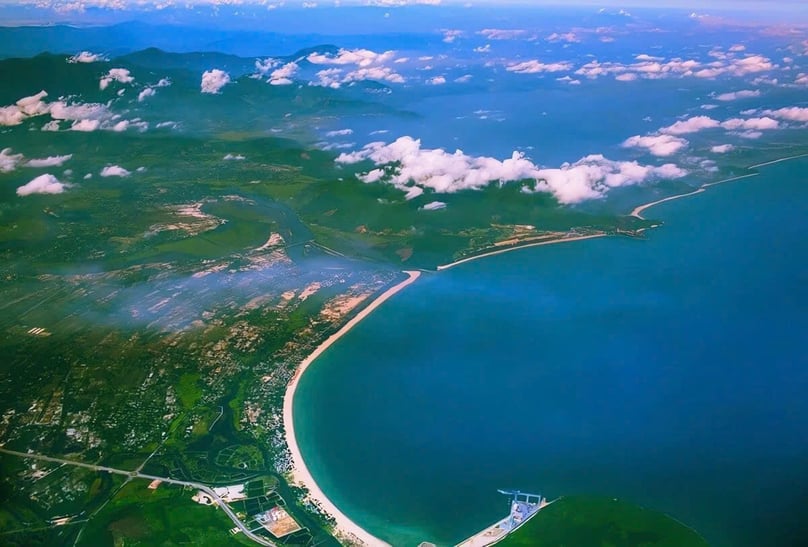
Chan May-Lang Co Economic Zone in Hue city, central Vietnam. Photo by The Investor/Dinh Duy.
Notable projects include the Chan May non-tariff zones No. 1 and 2 infrastructure development project, with a total area of over 503 hectares and combined investment capital of VND2.8 trillion ($108.23 million).
Another is the VND20 trillion ($773 million) Chan May Urban Area project (locations 1 and 2), which will cover 225 hectares and be implemented over five years.
The LNG terminal project at Chan May Port, 27 hectares with an investment of VND8.6 trillion ($332.43 million), is set for five-year implementation.
The 120-hectare Bai Ca eco-tourism project in Lang Co township will have investment capital of VND2.5 trillion.
The Lang Co beach resort, with an area of 45 hectares and total investment of VND4 trillion ($154.62 million), will be carried out over five years; while the 75-hectare Lap An lagoon tourism, urban development and resort complex in Lang Co township will cost VND6 trillion.
According to the management board of Hue Economic and Industrial Zones, since its establishment, Chan May-Lang Co Economic Zone has attracted 55 investment projects which remain valid, with total registered capital of VND97.32 trillion ($3.76 billion).
Among these, 15 are foreign-invested projects with combined capital of VND56.02 trillion ($2.17 billion), accounting for 57.56% of the total.
Several prominent foreign investors have established a presence in the zone, such as Banyan Tree Group (Singapore) with the Laguna Lang Co Resort and Winson Group (Taiwan) with the Billion Max Vietnam Export Processing Factory.
Chan May-Lang Co has become a destination for investments in sectors like tourism and resort development; seaport infrastructure; logistics; clean industry; and high-tech, environmentally friendly industries, with annual revenue reaching nearly VND4 trillion ($154.62 million) and tax contributions of around VND300 billion.
The management board said Hue city has proposed the Ministry of Construction review the adjustment of the EZ master plan through 2045, for submission to the Prime Minister.
The strategic goal is to develop Chan May-Lang Co into a key economic zone of central Vietnam – a coastal gateway offering logistics services for the central region and the East-West Economic Corridor, as well as a hub for high-end tourism services.
To attract investors, the local government will offer a range of incentives such as a 10% corporate income tax rate for 15 years from the first year the project generates revenue; import tax exemption for goods to create fixed assets for investment projects, and land and water surface rental exemptions, the board said.

Bac Giang International Logistics Centre launched

Vietnam’s Exclusive Economic Zone boasts over 1,000 GW of wind power potential: report

Uncertainty weighing on real estate

Central Vietnam city seeks $1.84 bln for 15 projects in economic zone

